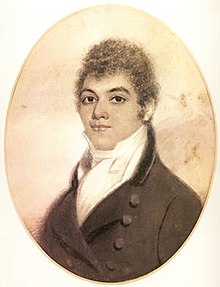George Bridgetower


George Augustus Polgreen Bridgetower (11 October 1778 – 29 February 1860) was a British musician, of African descent. He was a
Early career
George Augustus Polgreen Bridgetower was born on 11 October 1778, in
He exhibited considerable talent while still a child and gave successful violin concerts in
Relations with Beethoven
He was given leave to visit his mother and brother,
Return to England
Bridgetower returned to England, continued his musical career by teaching and performing, and was elected to the Royal Society of Musicians on 4 October 1807. He attended Trinity Hall, Cambridge where he earned the degree of Bachelor of Music in June 1811.[8]
He performed in the Philharmonic Society (later to become the Royal Philharmonic Society) of London's first season in 1813, leading the performance of Beethoven's Quintet,[9] and subsequently married Mary Leech Leeke in 1816. He later travelled abroad, particularly to Italy, where his daughter lived.
He died in 1860 in Peckham, south London, leaving his estate of £1,000 (equivalent to £99,930 in 2021) to his deceased wife's sister. The house was demolished in 1970, but a blue plaque now marks the site.[10] He is buried in Kensal Green Cemetery.[6]
Compositions
Bridgetower's own compositions include Diatonica armonica for pianoforte (London, 1812) and Henry: A ballad for medium voice and piano (London), as well as others. Many of his works were lost, as is the case for most non-canonical composers of this time period. There are a couple of his compositions were saved while the manuscripts are lost. One example of this that we know of is Sonata mulattica, a composition for violin and piano. A list of his compositions may be found in a 1990 article by
Legacy
Bridgetower appears as a character in the 1994 film Immortal Beloved, where he is shown playing the Kreutzer Sonata while Beethoven watches. The character of Bridgetower, played by Black violinist Everton Nelson, was described in the film as being of African heritage.[citation needed]
In the British film A Mulatto Song (1996), directed by Topher Campbell, Colin McFarlane was cast as Frederick DeAugust (Bridgetower's father), Cole Mejias as the young Bridgetower, and Everton Nelson as the adult Bridgetower.[12]
A book, Sonata Mulattica by Rita Dove, the Pulitzer Prize-winning former United States poet laureate, was published in 2009.[13][14]
A historical fiction novel written by Emmanual Dongala called La Sonate à Bridgetower (The Bridgetower Sonata) in 2017.[citation needed]
A short animation, Bridgetower, directed by Jason Young, features Chris Rochester as George Bridgetower and Stefano Leonardi as Beethoven.[15]
A jazz opera entitled Bridgetower - A Fable of 1807, by Julian Joseph and Mike Phillips, was commissioned by the City of London Corporation for the 2007 City of London Festival to commemorate the 200th anniversary of the first parliamentary bill to abolish slavery.[16] The role of Bridgetower was played by Cleveland Watkiss.[17]
A BBC Radio 3 documentary in July 2021 explored the possibility that Thirlwell was wrong and Beethoven did not actually fall out with Bridgetower, but merely dedicated the manuscript to a different person than the later printed edition. The documentary announced a forthcoming Edition Peters printing of Beethoven's Kreutzer Sonata under the name Bridgetower Sonata.[18]
References
- ^ Wight, C. "Bridgetower's early years". Bl.uk. Retrieved 29 July 2020.
- ^ George Grove and Simon McVeigh. "Bridgetower, George Polgreen." In Grove Music Online. Oxford Music Online
- .
- OCLC 266997138.
- ^ London Docklands Museum, artefact notes
- ^ a b Morrisroe, Patricia (4 September 2020). "The Black Violinist Who Inspired Beethoven". The New York Times. Retrieved 6 September 2020.
- ^ British Library
- ^ "Bridgetower, George Augustus Polgreen (BRGT811GA)". A Cambridge Alumni Database. University of Cambridge.
- ^ "Son of an African Prince - Music blog". blogs.bl.uk.
- ^ Slipped Disc, 13 October, 2022
- JSTOR 779389.
- ^ "A Mulatto Song". IMDb.com. Retrieved 29 July 2020.
- ^ Lee, Felicia R. (2 April 2009). "Poet's Muse: A Footnote to Beethoven". The New York Times.
- ISBN 978-0-393-07008-8.
- ^ Bridgetower, IMDb.com
- ^ "Bridgetower - A Fable of 1807. A new jazz opera by Julian Joseph and Mike Phillips". Julianjoseph.com. Archived from the original on 2 January 2017. Retrieved 29 July 2020.
- ^ Bridgetower - A Fable of 1807, Cast list Archived 3 March 2016 at the Wayback Machine.
- ^ "Sunday Feature, Reclaiming the Bridgetower Sonata". BBC. 4 July 2021. Retrieved 4 July 2021.
External links
- George Polgreen Bridgetower from the British Library
- George Bridgtower Archived 17 October 2011 at the Wayback Machine - 100 Great Black Britons
- George Augustus Polgreen Bridgetower (1780-1860) - African Heritage in Classical Music
- "Bridgetower - Black Musicians and British Culture", lecture by Dr Mike Phillips at Gresham College on 2 July 2007 (available for download in video and audio formats as well as a text transcript).
- essay on George Bridgetower
